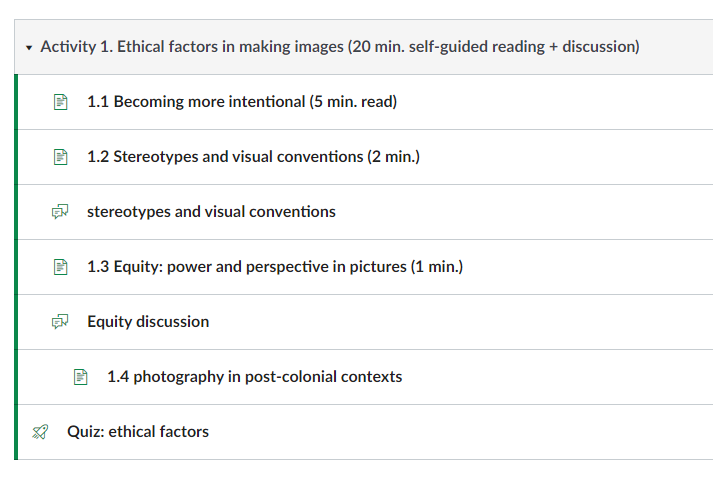
The Challenge:
Engineering students in both the Rising Sophomore Abroad program and the Biomedical Engineering course travel abroad to study and solve complex global issues that involve at-risk populations. Many of these students are required to bring back descriptive images to support their competency as global engineers. It is crucial on both an ethical level and a professional level that these engineering students use and make images that engage and represent their role in a global context that reflect the attainment of global engineering competency.
The Solution:

To address the gap for engineering students going abroad I led the development of new Canvas modules. The project explored the effects of photo-elicitation to promote global engineering competency by designing new online modules for existing courses. Using Canvas analytics on student engagement with the modules allowed rapid adaptations to enhance student learning and promote Global Engineering Competencies(GEC). We collected before and after data about global awareness, usage of the models and correlated those performance outcomes.
The Result:
The more students who unutilized the brief course the more those students displayed global awareness as an engineer. The project utilized Successive Approximation Module (SAM) to adapt student feedback once the initial data collection was over.
Published Article:
We propose to report on two aspects of an ongoing project to teach engineering students to learn from international experiences by taking more ethically sound photographs. First, we will examine baseline assessment data from a photo-elicitation assignment completed in summer 2019 alongside student scores on the Global Perspectives Inventory (GPI). Second, we will outline an online module to train students in the same course in spring 2020 to take better photographs of their short-term travel. This project is integrated into an existing first-year engineering course, “Global STEM Practice,” part of the Rising Sophomore Abroad Program (RSAP) at Virginia Tech. It is currently the largest faculty-led study abroad program at the university. Our work builds on published assessment research conducted by Engineering Education faculty and graduate students [1, 2, 3]. Through lectures and discussion sections that travel overseas for two weeks after final exams, RSAP seeks to increase students’ global engineering competency (GEC). Competency is measured at three points: week 1, week 15, and after they travel (+2 weeks), using several instruments, including the GPI. Beginning in 2019, RSAP students were asked to reflect on photographs taken during their short-term travel in terms of their own learning goals as engineers in a global STEM course. Instructors designed this photo elicitation assignment based on previous arts-informed methods used to explore students’ development of STEM identity [4]. A recent study evaluated photo-elicitation as a promising method to teach critical reflection to graduate engineering students [5]. Yet the scale of RSAP and its internal diversity—students attend one lecture course but travel independently to multiple locations— add complexity for using photo-elicitation to improve students’ GEC. A qualitative analysis of the 2019 assignments is being undertaken, deliberately incorporating visual data into mixed methods educational research informed by the literature [6, 7, 8]. Preliminary results indicate that having students take photographs without training in ethics and visual literacy risks reinforcing negative visual stereotypes and undermining GEC. While some students’ reflections indicate growth in terms of greater comfort with lifestyles that differ from their own and awareness of issues of equity and difference, others produce naïve, touristic, and even patronizing perspectives on non-US locales. Facing this pedagogical dilemma, Virginia Tech Engineering Online and the Office of Global Engineering, Engagement and Research collaborated to develop an online module to teach visual responsibility in spring 2020. The visual responsibility module will gather additional assessment data to address three related research questions: 1) How do students learn to see themselves as engineers in a global context? 2) How does learning to produce ethical images of engineering in a global context impact global engineering competency? 3) How does agile design of online modules affect student engagement and achievement of learning outcomes? By answering these questions, we hope to shed light on how best to teach engineering students to use and make images ethically in intercultural contexts as they gain global competency.
Emmett, R. S., & Murzi, H., & Watts, N. B. (2020, June), Teaching Ethical Photography to Deepen Global Engineering Competency Paper presented at 2020 ASEE Virtual Annual Conference Content Access, Virtual On line . 10.18260/1-2–35275
